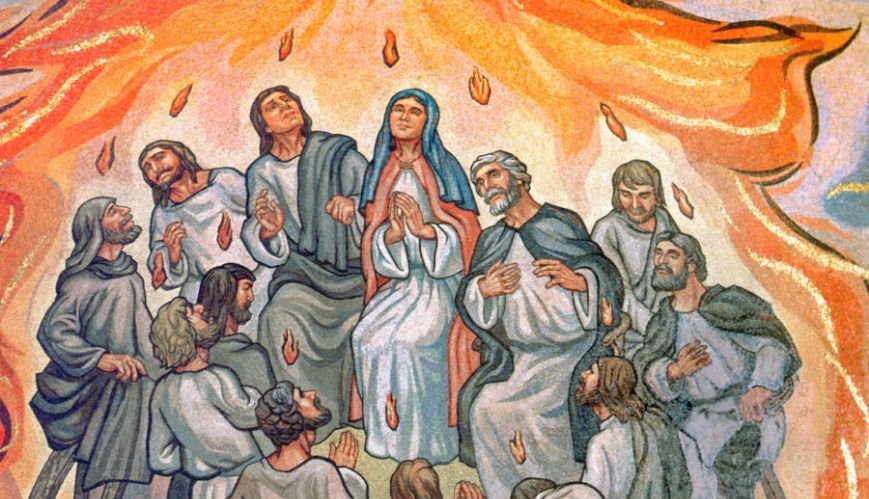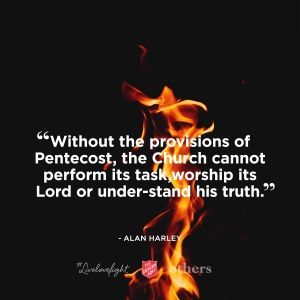The eternal flame

The eternal flame
29 May 2020
Without the provisions of Pentecost, the Church cannot perform its task, worship its Lord or understand his truth, says Alan Harley.
12 April 1906 is an important date in the history of Christianity. It’s the day the flame of Pentecostalism began to burn brightly in what became known as the Azusa Street Revival in Los Angeles. Many became suspicious of ‘the Pentecostals’. Some still are, mainly because of their spiritual exuberance and beliefs about the Holy Spirit. But the rise of the Pentecostal Church beckons our attention.
In this Pentecost feature (Pentecost Sunday this year is 31 May), Major Dr Alan Harley looks at the experience of Pentecost in the New Testament and subsequent spiritual awakenings. The fact is, he says, that Pentecost is for us all.
Just over 100 years ago, Pentecostalism was born. Now the fastest-growing branch of Christianity, it was initially viewed with great suspicion and encountered considerable opposition.
At a time when much of the Church had little to say about the person and work of the Holy Spirit, this movement, with its faith and life based on the Spirit’s empowering and gifts, emerged as a challenge to other denominations. It saw the events in Acts chapter two as normative and taught that every believer should be baptised with the Holy Spirit in the same manner as at Pentecost recorded in the New Testament book. Early Salvationists and Wesleyans also made much of what they called “the blessing of Pentecost”. For them, the evidence of being filled or baptised with the Spirit was not any of the spiritual gifts, but a cleansed life (see Acts 15:8, 9). Pentecost was, they taught, designed “to burn up every trace of sin” (Song 336, The Song Book of The Salvation Army).
Samuel Brengle was their spokesman. He stated: “We each and all need the Blessing of Pentecost, not simply for service, but for holy, worthy living.” For him, the Christian life was described by Paul when speaking of the fruit of the Spirit (Galatians 5:22, 23) and he taught that “only the Pentecostal Blessing can produce this fruit unto perfection in our lives”.
Pentecostal blessing
But Pentecostal blessing is not simply the coming of the Spirit into the lives of individual Christians. When the Spirit came in power at the first Pentecost, says Luke, “they were all filled”.
As the young Church spread beyond the confines of Judea and into Gentile territory, the same thing continued to happen. They “were all filled with the Spirit” when the Church was born in Samaria (Acts 8), in Caesarea (Acts 10) and in Ephesus (Acts 19). No distinction was made between ‘ordinary’ churches and ‘Spirit-filled’ churches as is sometimes the case today.
Every church was a Spirit-filled church. Any other kind of church was viewed as incomplete and not a true church (Acts 19:1-7). This infilling made possible the carrying out of the Church’s mission (Acts 1:8). It made it possible for Christians to “worship in spirit and in truth” (John 4:23, 24; Ephesians 5:18). It enabled them to understand God’s revelation (1 Corinthians 2:6-16).
The implications are clear. Without the provisions of Pentecost, the Church cannot perform its task, worship its Lord, or understand his truth. On the other hand, a Spirit-filled local congregation knows what it is to be God’s living witness, please him in worship and comprehend divine truth.
Pentecost speaks of completeness. Before its association with the coming of the Holy Spirit, it was a Jewish feast with two purposes. First, it was to acknowledge God’s dominion over their country and their labours by offering to him the first fruits of all their harvests. Second, it was to commemorate and give thanks to God for the law given from Mount Sinai on the 50th day after their escape from Egypt. It fell seven Sabbaths after the celebration of Passover when God spared the lives of many thousands of Jewish children in Egypt.
Today, what was true for the Jewish calendar is true for us. The Holy Spirit came 50 days after Calvary, and the work of Christ was complete. Christ came not only to save sinners but to raise up a Spirit-filled people – his Church – to admit us into life in the Spirit, a life marked by holiness and power, a full salvation.
A present experience
“We want another Pentecost,” wrote our founder, William Booth. The theological purist may argue that it is no more possible to have another Pentecost than to have another Calvary. Happily, the story of the Church is a story of outpourings of the Spirit so akin to Pentecost that Booth’s song makes sense. We have come to call these events ‘revival’.

One of the greatest of these was in the 18th century. It began seven months after John Wesley was converted. On New Year’s Eve, 1738, Wesley and about 60 others met to hold a ‘watchnight’ service – an all-night prayer meeting to greet the new year. His journal entry for 1 January 1739 gives a clear description of what happened: “About three in the morning, as we continued instant in prayer, the power of God came mightily upon us, insomuch that many cried out for exceeding joy, and many fell to the ground. As soon as we recovered a little from the awe and amazement at the presence of His Majesty, we broke out with a loud voice, ‘We praise Thee, O God, we acknowledge Thee to be the Lord.’”
Following this ‘upper room’ experience, revival spread across Britain and beyond. Its impact was felt in the life of William Booth a century later. The movement he founded in 1865 and which spread rapidly around the world was motivated and empowered by the same revival blessing known by Wesley and his workers. For these leaders, Pentecost was not an event in the distant past. It was a present experience.
We need Pentecost – God’s continual work of reviving – today. We need it in our personal lives if we are going to be effective, power-filled, Christ-like disciples. We need it in our congregations if we are going to make a significant impact on our communities. We need it in our movement if we are to be a vital, life-changing force throughout the world. Revival is God’s answer to the cry of his people: “We need another Pentecost – send the fire today.” It raises the Church to the level of New Testament Christianity. It produces Christ-like Christians. It creates praying, worshipping, witnessing congregations. It replaces discouragement and frustration with holy and joyful optimism. It sees the community changed by the power of the Gospel.
A 21st Century Pentecost?
Despite antagonists’ claims that the Church is in its death throes, there are many signs of renewal. Certainly, some older churches are closing. But all over Australia Christians are meeting in school halls and private homes to worship, study and encourage one another. And some of those older churches are being revived. New ways of being the Body of Christ are emerging.
Across the land, within the denominations, we are witnessing a movement of God led by young Christians with a passion for the things of God. They may not be too concerned about choirs, liturgy, brass bands and other older ways of worship and witness. But they are concerned to be true people of God in the power of the Holy Spirit. This may or may not be another Pentecost, but it is certainly evidence that what God initiated at Pentecost is still at work. Let’s rejoice in the evidences of new life.
Let’s not allow ourselves to get left behind if God is doing a new thing. Let’s remain open to the Holy Spirit – to all he wants to do in our lives, in our congregations, in our movement, and in our nation. It may mean opening up our lives and our congregations to new ways of worship and witness. Or it may mean seeing the Holy Spirit giving a fresh anointing to the things we call ‘traditional’.
Whatever the case, one thing is for sure. Pentecost is about us. It is about God renewing our spirit, mind and body. It is about God changing us from the inside out. This then enables us to assess our mission and worship methodology with a wisdom not encumbered by too much human baggage. It becomes easier for us to let go and let God. And it allows us to continually shape the dynamism and effectiveness of our methodology. Let’s stay open to God. Let’s claim by faith all he seeks to give us. Let’s resolve always to be “filled with the Spirit” (Ephesians 5:18). Then we’ll discover, in our lives and in our congregations, that Pentecost is not just an event of long ago. We will discover that Pentecost, with its empowering, cleansing, renewal and blessing, is for us today.